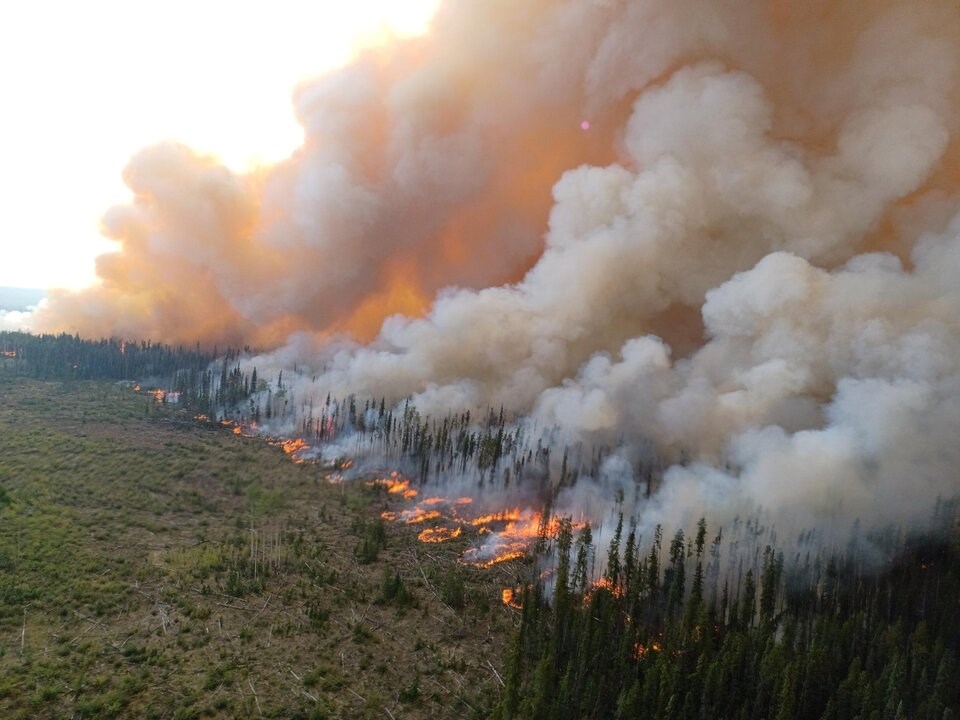Powerful winds expected to blow across B.C.’s north could whip up wildfire activity over the weekend, warn meteorologists and the province's wildfire service.
The BC Wildfire Service says winds of up to 80 kilometres per hour could blow across the Northwest and Prince George fire centres into Saturday.
“This combined with hot and dry conditions will lead to significant rates of spread,” warned the service in a social media post.
Bobby Sekhon, a meteorologist with Environment and Climate Change Canada, said the situation could lead to “fast-spreading wildfires” and is “definitely one to watch.”
“What we're seeing today and into tomorrow are going to be some strong westerly winds and that's definitely concerning, because that can lead to aggressive wildfire behaviour,” Sekhon said.
Further south in the province, outflow winds are expected to bring low concentrations of smoke from Interior and Fraser Valley wildfires. That smoke is expected to spread across Metro Vancouver and Vancouver Island over the weekend.
Sekhon said he is expecting “hazy skies” with moderate to low impact on human health.
On the South Coast, a ridge of high pressure is expected to bring temperatures up to 27 degrees Celsius inland throughout the weekend. Sekhon says that’s a few degrees above the seasonal average.
Drought conditions could last into next year, says minister
In Metro Vancouver and southern Vancouver Island, Sunday will come with a chance of showers, and by the middle of next week, precipitation could fall across much of the province.
But Sekhon says the small amount of rain will do little to alleviate extreme drought conditions that now stretch uninterrupted from the B.C. Southern Interior to Vancouver Island, and extend into the north.
“The drought situation goes back almost a year,” he said. “It’s going to take more than just a little bit of precipitation to come back from that.”
About 80 per cent of B.C. is under level four or five drought, the two highest designations. The dry conditions have contributed to a record wildfire season in B.C., in which fires have burned an area equal to about 60 per cent of Vancouver Island. Across Canada, the record season has now devastated nearly 156,000 square kilometres, almost two thirds of England, Scotland and Wales combined, and more than double that burned in 1989, the previous record.
“It is a concern for us that the drought season could last beyond this calendar year and into the following year,” said Emergency Management Minister Bowinn Ma Thursday.
“It is one of the reasons why we have been imploring communities and water users to take voluntary measures to conserve water now. It is a very serious situation that British Columbia has not faced before, and it is absolutely necessary that people change their mindset about water here in British Columbia as a result of the impacts that we're seeing due to climate change.”
A global Climate Shift index run by the research group Climate Central, showed Friday’s temperatures across B.C.'s coastal regions were made between twice and five times hotter due to human-caused climate change.
State of emergency extended
Ma said the province would be extending a state of emergency until Sept. 14 in order to respond to more than 400 fires burning across B.C.
Premier David Eby had announced the state of emergency on Aug. 18, as fires swept down on West Kelowna in the B.C. Interior and evacuations soared across the province.
“I'd like to stress one more time that we are still in peak wildfire season,” Ma said. "People across the province, particularly in the north, must stay vigilant and be prepared to evacuate if needed.”
About 4,200 people in B.C. remained on evacuation order, with 65,000 on evacuation alert to be ready to leave their homes on short notice, Ma said. During the peak of the crisis, 30,000 people across the province were ordered out of their homes last week, and hundreds of homes have been destroyed.
With files from the Canadian Press



